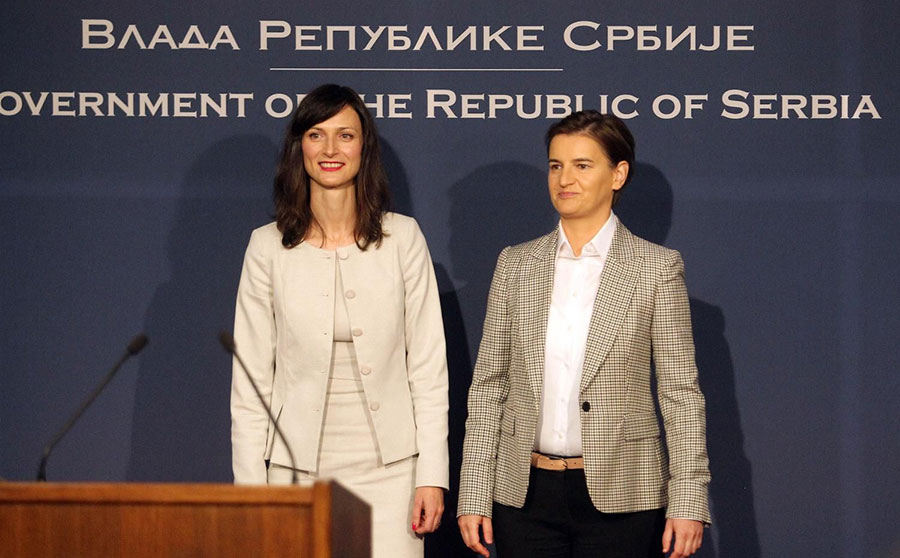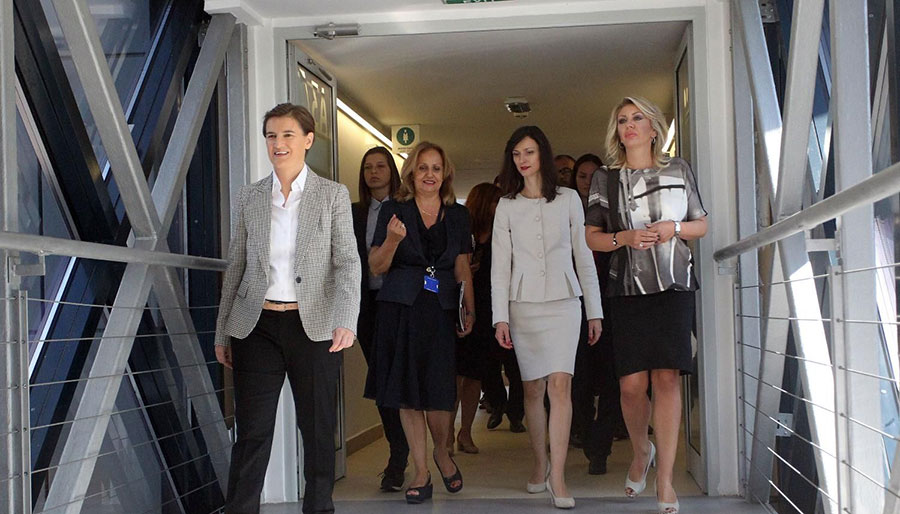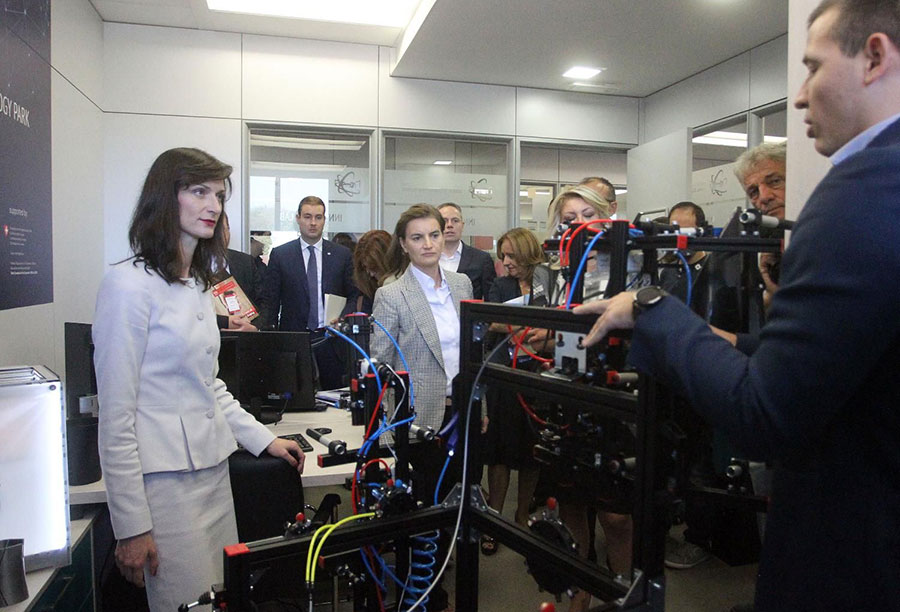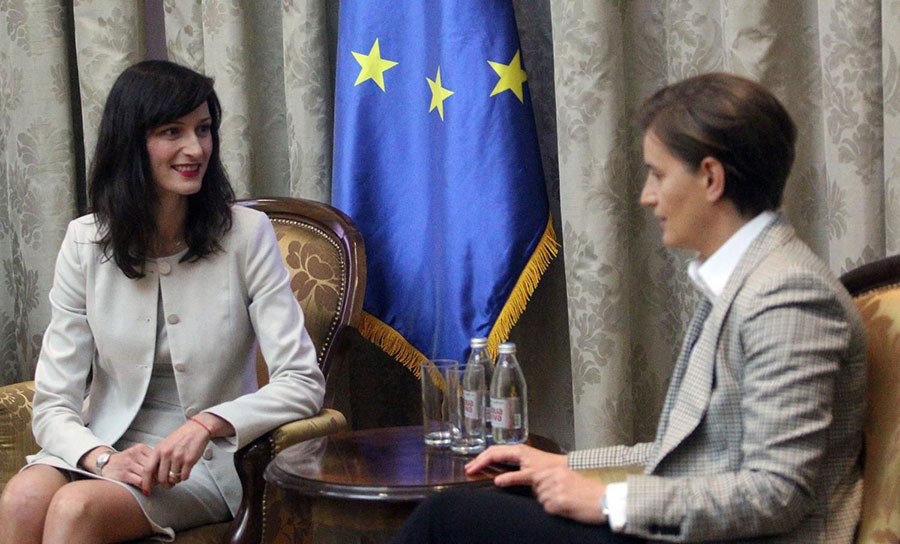European Commissioner for Digital Economy and Society Mariya Gabriel said that Serbia has played an important role in the region, being the most developed country in the Western Balkans in the digitalisation domain.
During her visit to Belgrade, Gabriel met with Prime Minister Ana Brnabić, ministers Rasim Ljajić and Jadranka Joksimović, and visited State Data Center, Technology Park and RATEL.
“We are impressed with your advancement in the field of digitalisation”, Commissioner Gabriel said at the press conference held together with Prime Minister Brnabić.
She added that cyber security was very important both for Serbia and European Commission, adding that the talks would continue in order to make a national strategy in that domain.

Fonet
Gabriel said that it was time to “invest in people”, with estimated showing that after 2020, 80 percent of jobs would require digital literacy while data showed that 44 percent of people in Europe did not have such capabilities.
“Digital future begins now. I thank Serbia for being among the drivers”, Gabriel said.
Gabriel: Roaming will be revoked when countries from the region become EU members
Gаbriel said that roaming for Western Balkans would be revoked when the countries in the region become members of the European Union, but until then, a decrease of prices would be worked on.
“Serbia and the region should become EU members and at that moment, there will be no special roaming prices. Now we are talking about decrease of roaming prices,” Gabriel said, adding that the plans were to have a price for a megabite in roaming at 70 cents by the summer of 2019 and 20 cents bz the year 2021.

Fonet
“Now you often get a message that the price is 14 Euros,“ Gabriel said.
Commissioner said that the decresae of roaming prices is a priority in the Western Balkans Digital Agenda, because it would benefit citizens in the region, but also the economy.
“We are counting on the readiness of the countries in the region to go forward. There is already an agreement with four countries,“ Gabriel said, adding that she hoped she would soon have a clear schedule when and how the prices of text messages and calls would be reduced.
Prime Minister Ana Brnabić said that digitalisation is the most important priority of her government, while the first goal is digitalisation of public administration, and the secoond – digitalisation of society and economy.
She announced that, from January 1, citizens would be able to pay property taxes digitally, while the plans for construction onf back-up data center in Kragujevac were underway. Also, on October 1, a programme of tax initiatives for University graduates and highschool graduates who want to start their business will begin and they will not pay taxes and contributions during the first year of work.
Brnabić also announced that Serbia should become 23rd member of CERN during the first quarter of 2019.
EU support for innovations
Commissioner Gabriel visited State Data Center where key information-communication infrastructure of the Republic of Serbia is based in, where director of the IT and eAdministration Office and host Mihailo Jovanović presented plans for construction of the secondary State Data Centre to be built in Kragujevac, which the Government of Serbia has declared a Project of strategic importance.
Jovanović thanked Commissioner Gabriel and stressed that her visit was very important as it has shown that Serbia was on the right way of digital transformation.
During the tour of Scientific-Technology Park, Commissioner Gabriel announced that EU would take over its financing in the amount of 1.5 million Euros.
Gabriel said that based on already given grants, innovative companies have reached concrete results and added that 17 companies have managed to make a profit by selling their products or offering services.

Fonet
Speaking about Scientific-technological park in Belgrade, she stressed that it was a great indicator of Serbia’s success in the innovation, science and technology domain.
“I am glad that I have seen some great examples here. You are working not only on ideas, but realise those ideas in reality. We have seen how all these services can help citizens, farmers, that digitalisation can show in reality that it has a potential to help both traditional sectors and some new ones, to develop and to become something that will lead us further towards future,” she said.
More information on future EU support to Scientific-Technology Park Belgrade can be found here
Prime Minister Ana Brnabić thanked EU for support and financial assistance. More information about projects financed by the EU in the competence and innovation domain, as well as support to small and mid-size companies can be found here
Brnabić said that the Serbian Government, in a partnership with European Investment Bank and its affordable loan, planned investment worth 60 million Euros in the next few years.
She said the plans have been made to expand Scientific-Technology Park in Belgrade, construct a new building for the Faculty of Organisational Sciences and a building within the Physics Institute, a laboratory for the Electrical Engineering Faculty. According to her, construction of a Scientific-Technology Park has been underway in Novi Sad, while foundations for Scientific-Technology Park in Niš should be done in the next couple of weeks.
Also, she said, more funds from the budget would be invested in the Innovation Fund and expressed hope that a law previewing setting up a Science Fund would be adopted by the end of this year.
European Integration Minister Jadranka Joksimović said that Serbia was getting around 200 million Euros per year from IPA funds for different projects in different domains, while an “important part is dedicated for start-up entrepreneurships, focused on innovative activities.”
“From 2013 till now, around 24 million Euros of non-returnable European funds have been dedicated to a development of innovative entrepreneurship, while in 2016, we have managed to negotiate non-returnable 20 million Euros for start-up small and mid-size companies through a grant scheme for more affordable commercial loans from commercial banks,” Joksimović said.
Joksimović said that IPA package 2018 was being negotiated now, adding that she expected more significant package of funds from EU of about 7.5 million Euros, while 2.5 million Euros would be allocated from the budget to this domain.
Director of the Innovation Fund Ivan Rakonjac said that this Fund has been using IPA funds since its operative activity start in 2011, adding that thanks to these resources, they have developed first programmes.
“So far we were given 14.5 million Euros from EU,” Rakonjac said.
More information of EU support to the Innovation Fund of Serbia and project financed by EU in the innovation, research and transfer of technology domain can be read here.




